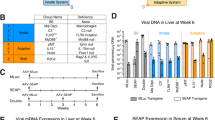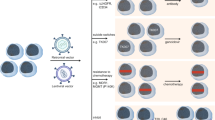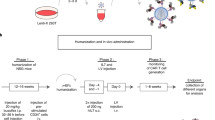Abstract
The use of replication–defective adenoviruses (RDAd) for human gene therapy has been limited by host immune responses that result in transient recombinant gene expression in vivo. It remained unclear whether these immune responses were directed predominantly against viral proteins or, alternatively, against foreign transgene–encoded proteins. In this report, we have compared the stability of recombinant gene expression in adult immunocompetent mice following intramuscular (i.m.) injection with identical RDAd encoding self (murine) or foreign (human) erythropoietin. Our results demonstrate that immune responses directed against foreign transgene–encoded proteins are the major determinants of the stability of gene expression following i.m. injection of RDAd. Moreover, we demonstrate long–term recombinant gene expression in immunocompetent animals following a single i.m. injection of RDAd encoding a self protein. These findings are important for the design of future preclinical and clinical gene therapy trials.
This is a preview of subscription content, access via your institution
Access options
Subscribe to this journal
Receive 12 print issues and online access
$209.00 per year
only $17.42 per issue
Buy this article
- Purchase on Springer Link
- Instant access to full article PDF
Prices may be subject to local taxes which are calculated during checkout
Similar content being viewed by others
References
Kozarsky, K.F. & Wilson, J.M. Gene therapy: Adenovirus vectors. Curr. Opin. Genet. Dev. 3, 499–503 (1993).
Kremer, E.J. & Perricaudet, M. Adenovirus and adeno-associated virus mediated gene transfer. Br. Med. Bull. 51, 31–44 (1995).
Brody, S.L. & Crystal, R.G. Adenovirus-mediated in vivo gene transfer. Ann. N. Y. Acad. Sci. 716, 90–101 (1994).
Dai, Y. et al. Cellular and humoral immune responses to adenoviral vectors containing factor IX gene: Tolerization of factor IX and vector antigens allows for long-term expression. Proc. Natl. Acad. Sci. USA 92, 1401–1405 (1995).
Smith, T.A.G. et al. Adenovirus mediated expression of therapeutic plasma levels of human factor IX in mice. Nature Genet. 5, 397–402 (1993).
Kozarsky, K.F. et al. In vivo correction of low density lipoprotein receptor deficiency in the Watanabe heritable hyperlipidemic rabbit with recombinant adenoviruses. J. Biol. Chem. 269, 13695–13702 (1994).
Quantin, B., Perricaudet, L.D., Tajbakhsh, J. & Mandel, J. Adenovirus as an expression vector in muscle Cells in vivo. Proc. Natl. Acad. Sci. USA 89, 2581–2584 (1992).
Rosenfeld, M.A. et al. In vivo transfer of the human cystic fibrosis transmembrane conductance regulator gene to the airway epithelium. Cell 68, 143–155 (1992).
Barr, E. et al. Percutaneous transluminal gene transfer into the heart using replication-defective recombinant adenovirus. Gene Ther. 1, 51–58 (1994).
Yang, Y., Ertl, J. & Wilson, J.M. MHC class I-restricted cytotoxic T lymphocytes to viral antigens destroy hepatocytes in mice infected with El-deleted recombinant adenoviruses. Immunity 1, 433–442 (1994).
Yang, Y., Li, Q., Ertl, H.C. & Wilson, J.M. Cellular immunity to viral antigens limits E1-deleted adenoviruses for gene therapy. Proc. Natl. Acad. Sci. USA 91, 4407–4411 (1994).
Yang, Y. et al. Cellular and humoral immune responses to viral antigens create barriers to lung-directed gene therapy with recombinant adenoviruses. J. Virol. 69, 2004–2015 (1995).
Tripathy, S.K. et al. Stable delivery of physiologic levels of recombinant erythropoietin to the systemic circulation by intramuscular injection of replication-defective adenovirus. Proc. Natl. Acad. Sci. USA 91, 11557–11561 (1994).
McDonald, J.D., Lin, F.K. & Goldwasser, E., Cloning, sequencing, and evolutionary analysis of the mouse erythropoietin gene. Mol. Cell.Biol. 6, 842–848 (1986).
Rawle, F.C. et al. Specificity of the mouse cytotoxic T lymphocyte response to adenovirus 5: E1A is immunodominant in H-2b, but not in H-2d or H-2k mice. J. Immun. 146, 3977–3984 (1991).
Barr, D. et al. Strain related variations in adenovirally mediated transgene expression from mouse hepatocytes in vivo: Comparisons between immunocompetent and immunodeficient inbred strains. Gene Ther. 2, 151–155 (1995).
Koller, B.H., Marrack, P., Kappler, J.W. & Smithies, O. Normal development of mice deficient in beta 2M, MHC class I proteins, and CDS+ T Cells. Science 248, 1227–1230 (1990).
Zinkernagel, R.M. et al. Virus-induced autoantibody response to a transgenic viral antigen. Nature 345, 68–71 (1990).
Ohashi, P.S. et al. Ablation of “tolerance” and induction of diabetes by virus infection in viral antigen transgenic mice. Cell 65, 305–317 (1991).
Weigle, W.O. Termination of acquired immunological tolerance to protein antigens following immunization with altered protein antigens. J. Exp. Med. 116, 913–928 (1962).
Mamula, M.J., Lin, R.H., Janeway, C.J. & Hardin, J.A. Breaking T Cell tolerance with foreign and self co-immunogens: A study of autoimmune B and T Cell epitopes of cytochrome c. J. Immun. 149, 789–795 (1992).
Lin, R.H., Mamula, M.J., Hardin, J.A. & Janeway, C.J. Induction of autoreactive B Cells allows priming of autoreactive T Cells. J. Exp. Med. 173, 1433–1439 (1991).
Engelhardt, J.F. et al. Adenovirus-mediated transfer of the CFTR gene to lung of nonhuman primates: Biological efficacy study. Hum. Gene Ther. 4, 759–769 (1993).
Engelhardt, J.F. et al. Direct gene transfer of human CFTR into human bronchial epithelia of xenografts with El-deleted adenoviruses. Nature Genet. 4, 27–34 (1993).
Simon, R.H. et al. Adenovirus-mediated transfer of the CFTR gene to lung of nonhuman primates: Toxicity study. Hum. Gene Ther. 4, 771–780 (1993).
Engelhardt, J.F., Ye, X., Doranz, B. & Wilson, J.M. Ablation of E2A in recombinant adenoviruses improves transgene persistence and decreases inflammatory response in mouse liver. Proc. Natl. Acad. Sci. USA 91, 6196–6200 (1994).
Engelhardt, J.F., Litzky, L. & Wilson, J.M. Prolonged transgene expression in cotton rat lung with recombinant adenoviruses defective in E2a. Hum. Gene Ther. 5, 1217–1229 (1994).
Yang, Y. et al. Inactivation of E2a in recombinant adenoviruses improves the prospect for gene therapy in cystic fibrosis. Nature Genet. 7, 362–369 (1994).
Kay, M. et al. Long-term hepatic adenovirus-mediated gene expression in mice following CTLA41g administration. Nature Genet. 11, 191–196 (1995).
Goldwasser, E. & Sherwood, J.B. Radioimmunoassay of erythropoietin. Br. J. Haematol. 48, 359–363 (1981).
Author information
Authors and Affiliations
Rights and permissions
About this article
Cite this article
Tripathy, S., Black, H., Goldwasser, E. et al. Immune responses to transgene–encoded proteins limit the stability of gene expression after injection of replication–defective adenovirus vectors. Nat Med 2, 545–550 (1996). https://doi.org/10.1038/nm0596-545
Received:
Accepted:
Issue Date:
DOI: https://doi.org/10.1038/nm0596-545
This article is cited by
-
ISSLS prize in basic science 2021: a novel inducible system to regulate transgene expression of TIMP1
European Spine Journal (2021)
-
Understanding the molecular biology of intervertebral disc degeneration and potential gene therapy strategies for regeneration: a review
Gene Therapy (2018)
-
Size-dependent gene delivery of amine-modified silica nanoparticles
Nano Research (2016)
-
Fluorescent silicon nanoparticle-based gene carriers featuring strong photostability and feeble cytotoxicity
Nano Research (2016)
-
Cardiac AAV9 Gene Delivery Strategies in Adult Canines: Assessment by Long-term Serial SPECT Imaging of Sodium Iodide Symporter Expression
Molecular Therapy (2015)



